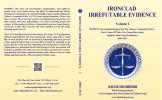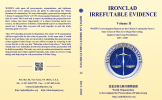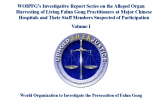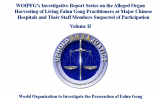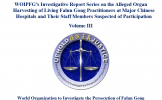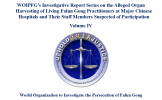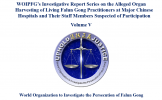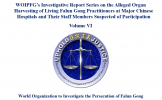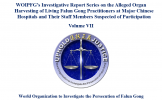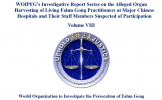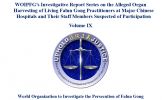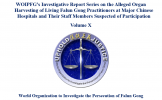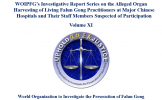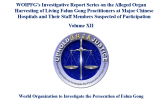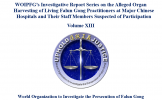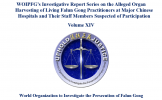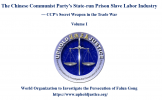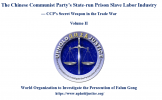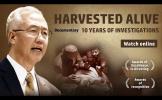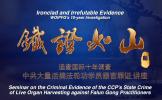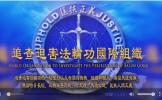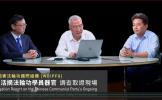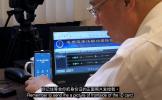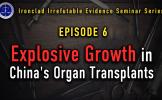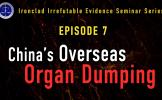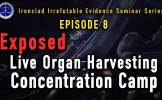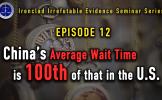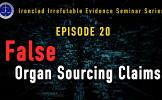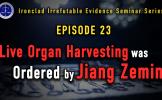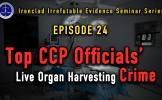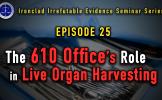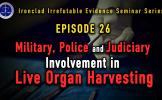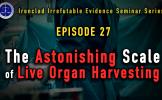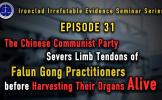China Council for the Promotion of Peaceful National Reunification (CCPPNR) – A Tool for the Chinese Communist Party’s United Front Work
The China Council for the Promotion of Peaceful National Reunification (CCPPNR) presents itself as a non-governmental organization (NGO) aimed at peacefully unifying Taiwan. In fact, it is an organization under the United Front Work Department of the Central Committee of the Chinese Communist Party.
The CCPPNR frequently organizes public activities in its respective host countries and political circles. Under the title of NGO, it has established branches in different countries. Its goal is to establish and develop a political alliance – with the Chinese Communist Party being its core leadership alliance [1] – and carry out the Communist Party’s united front strategy to influence policymaking in its host countries, and to enhance the Chinese communist regime’s control and influence in the world.
The CCPPNR in various countries were founded as NGOs but take orders from Beijing and implement Communist Party policies.
This report exposes the CCPPNR as a tool for the Chinese Communist Party’s united front work.
First published: May 20, 2011 as Investigative Report on CCPPNR Led United Front Work
Updated: July 1, 2011, July 21, 2017
Copy edited: September 4, 2017
Contents
1 Introduction
2 Patronage and membership of foreign dignitaries
3 Relationship with the Chinese Communist Party
3.1 Purpose and intent of overseas CCPPNR branches
3.2 Regular Beijing conferences for overseas CCPPNR leaders
3.4 Overseas representation of Chinese Communist Regime
4 Conclusion
1 Introduction
1.1 How the CCPPNR began
The establishment of CCPPNR; its leadership members and its nature as a united front work organization
China Council for the Promotion of Peaceful National Reunification (CCPPNR) was established in Beijing, China on September 22, 1988. Initially it claimed that it was “a non-governmental group organized by all circles of people who advocate peaceful unification of China.” [2] Heads of different democratic parties served as former presidents of the CCPPNR. In China, democratic parties are said to be “participating parties under the premise of acknowledging the leadership of CCP.”
Overseas CCPPNR branches were established one after another around 2000 [5]. As a platform for the united front work in overseas countries, these CCPPNR branches have explicit tasks: First, “melting into local high level political circles;” and second, “influencing [local] mainstream society.”
By September 27, 2004, the Central Committee of the Chinese Communist Party started to directly control the CCPPNR, and it became an organization directly under the United Front Work Department of the CCP Central Committee [6].
1.2 Current leadership
The current (2011) president of CCPPNR is Jia Qinglin, who is on the CCP Central Committee Political Bureau Standing Committee, and is chairman of the Chinese People's Political Consultative Conference (CPPCC).
The vice president is Liu Yandong, minister of the CCP Central Committee United Front Work Department [7].
The Party secretary of the CCP committee for CCPPNR is Liang Jinquan, a former Deputy Minister of CCP Central Committee United Work Department standing committee [8,9].
1.3 The Taiwan issue
Communist China has always claimed that the Taiwan issue is its internal affair in which no forces from other countries should intervene. The key members of the overseas CCPPNR are, however, former and incumbent officials (including former heads of state) of foreign countries and overseas Chinese. It is obvious that the establishment of such associations serves to invite others to interfere in its internal affairs.
Only a state government, such as the U.S. federal government, has the privilege to recognize another country’s national sovereignty and territorial integrity, and a local government has no right to be involved with foreign affairs.
Most countries in the world have no diplomatic relations with Taiwan and only recognize the Chinese communist regime. The activities sponsored by overseas CCPPNR are mainly carried out in countries that have no diplomatic relations with Taiwan and there is no issue with these countries’ diplomatic policy with regard to unification or independence of Taiwan. It is quite odd and suspicious that the activities by the overseas councils are promoted in high profile in these countries.
2 Patronage and membership of foreign dignitaries
Key members of CCPPNR overseas organizations are former and incumbent officials of foreign countries and Chinese naturalized in a foreign country
The following is a partial list of dignitaries’ local countries that are members of the associations for Promotion of Peaceful National Reunification.
2.1 Australia
The Hon. Gough Whitlam, patron of Australia Council for the Promotion of Peaceful Reunification of China (ACPPRC), was a former Australian prime minister.
- In July 1971, Whitlam visited China as the leader of the opposition party. He promised Zhou Enlai, the Chinese prime minister at the time, that if the Labor Party won the election of the following year, Australia would establish diplomatic relations with China within a month and he would visit China within a year.
- In December 1972, the Labor Party won the election and Whitlam became prime minister. On December 21, the same year, Australia officially established diplomatic relations with China.
- In October 1973, Whitlam led a government delegation and paid an official visit to China. He received a warm reception of Zhou Enlai's "hospitality."
- In February 2002, Whitlam became a patron of the Australia ACPPRC (the ACPPRC Second Term to Fifth Term Honorary Board Patrons).
- On the evening of December 11, 2002, Whitlam was awarded the “friendship envoy” certificate and medal by Yang Rudai, the vice Chinese chairman of CPPCC (Chinese People's Political Consultative Conference), in recognition for his “outstanding contribution” to the development of Sino-Australia relations [11].
The Hon. Bob Hawke AC, patron of the Australia Council for the Promotion of Peaceful Reunification of China (ACPPRC), was a former Australian prime minister.
- In July 2000 when ACPPRC was established, Hawke was a patron of the ACPPRC (First Term Honorary Board Patrons) [12].
- As early as July 1993, Hawke was employed by a Chinese government think tank—China Institute of Strategy & Management, simply referred to as "CISM."
CISM was set up by Xiao Ke, a Chinese admiral, and Gu Mu, a former Vice Premier [13]. Its members were basically composed of CCP party-founding veterans. Its deputy directors included: Zhang Aiping, the former Defense Minister; Li Yaowen, a navy admiral; Dong Liangju, former executive director of the General Office of the Military Commission of the CCP Central Committee. The current director is Zheng Bijian, former standing vice president of the Party School of the CCP Central Committee. According to the institute, the Hawke was the first senior foreign consultant hired by the CISM [15].
The Rt. Hon. Malcolm Fraser AC CH, patron of ACPPRC, was a former prime minister of Australia. He was a patron of ACPPRC when it was established in July 2000 [16].
2.2 Brazil
Li Anni, honorary chairman of Rio Council for the Promotion of Peaceful Reunification of China in Brazil was a three-star admiral of the country, with quite an extensive network of contacts in the military and among politicians.
- According to Zhan Huihua, chairman of Rio Council for the Promotion of Peaceful Reunification of China, she invited Admiral Li Anni and other dignitaries in Rio and Brazil to participate in activities sponsored by the Council [18]. The Council eventually invited Li Anni to be its honorary chairman.
- According to Xinhua News Agency, Li Anni was introduced to the consulate general of China in Rio soon after he assumed the honorary position. He referred major Brazilian entrepreneurs to the Chinese consulate general in Rio at the same time.
- In late August 2006, Li Anni visited China as a member of the visiting delegation of Rio Council for the Promotion of Peaceful Reunification of China and he was entrusted by Camargo Correa [19], one of the largest conglomerates in Brazil, to bring with him the company's investment letter of intent to China [20].
2.3 Mozambique
The former presidents of Mozambique, Joaquim Chissano, Armando Guebuza, and Prime Minister Luísa Días Diogo, Speaker of Parliament of the Republic of Mozambique Eduardo Joaquim Mulemb became honorary advisers to the Mozambique Council for the Promotion of Peaceful Reunification of China
- Jiang Yongsheng, head of CCPPNR in Mozambique, published a book titled "Eighteen years—the Presidents and a Doctor,” in which he detailed how he successfully persuaded presidents in this country (during different terms) and politicians to become members of CCPPNR, taking advantage of his position as a private health doctor for these presidents.
- As early as August 1991, Jiang, who was director of Acupuncture Research Department of Luzhou Medical College and associate professor of Acupuncture Department at the Affiliated Traditional Chinese Medicine Hospital, was deployed by the Chinese Ministry of Health to the Central Hospital of the Chinese medical team working in Mozambique.
- In August 1994, Jiang was hired by Mozambican Defense Department as the acupuncturist for Maputo Army General Hospital; he also served as former President Chissano's physician.
- In August 2002, Jiang persuaded President Joaquim Chissano to become the Honorary President of CCPPNR in Mozambique (President Chissano assumed the role as lifetime Honorary President of CCPPNR after his retirement).
- In 2005, President Guebuza and Prime Minister Diogo accepted Jiang’s invitation and became honorary president and honorary consultant of CCPPNR in Mozambique, respectively.
- On February 6, 2006, Dr. Eduardo Mulunbuwei, speaker of the House, also became an honorary consultant for CCPPNR. [21]
- On September 10, 2007, the CCPPNR of Mozambique held a Standing Committee Conference at the Chinese Embassy in Mozambique. A paper was presented at the conference titled “Finding Innovative Approaches Based on the Local Situation; to carry out our work targeting the upper social levels in the respective countries we work in.” The paper was published as an experience exchange article at the Second Standing Committee Conference of the Seventh Session, with Jiang Yongsheng as the speaker. [22].
2.4 United States
Xu Huazhang (aka William Quan Hua; Xu, Hwa-Chang), is currently the chairman of CCPPNR in the United States, and executive director of the standing committee for CCPPNR’s 2010-2011 term [23]. He is a member of the U.S. Republican Party, and an immigration consultant.
Born in Saigon and a native of Chaozhou, Guangdong Province, China, he served as consultant for international affairs for the mayor of Houston for three terms, vice chairman of the Houston Republican Party’s Asian Division, vice chairman of Asian American Voters Association in Houston, president of the Houston-Shantou Friendship Sister City Association, the only standing consultant for Chinese Alumni Association in Greater Houston, and Chinese Students and Scholars Association in Houston. He is also chairman of the board for Yi Hua Co., Ltd., and vice chairman of the board for H.H.T International Investment Partner Group.
Xu settled in Houston after he graduated from business school at Oklahoma State University. He started operating a liquor chain store in 1981 [24]. In 1985, he took part in the Republican Party. In 1998, he was appointed a consultant for the U.S. Immigration Bureau. He served as a member of the core organization of Republican senators and vice president of the Republican Party’s Asia Division in Houston.
In May 2002, Xu accompanied Mayor Lee P. Brown during his visit to China as the mayor’s consultation committee member for international affairs, and signed a number of commercial contracts [25]. They were received by former CCP chairman Jiang Zemin [26]. Upon returning to the United States, Xu and other leaders of the overseas Chinese Associations made plans to establish a CCPPNR in Houston. This organization was formally launched on October 12, 2002, and Xu served as the president [27]. Between October 23 and October 25 of the same year, during Jiang Zemin's visit to Houston, Xu participated in the welcome activities [28].
Shi Yinuo is the general chairman of CCPPNR New York, a member of the U.S. Democratic Party, chairman of the Asian Democratic Party, member of the U.S. House and Senate Committee, and honorary president for life for the World Chinese Association. Shi was born in Shanghai in 1935. He left Shanghai for Taiwan in 1949, and joined the KMT. In 1960, he was a wanted criminal because he rebelled against the KMT. He entered Hong Kong as an illegal immigrant. According to media reports, Shi fled to the United States on June 24, 1964, where he became a wealthy businessmen.
Since 1977, Shi has donated a certain amount of money every year, from his personal income, to high-ranking officials in the U.S. government, as campaign funds. He started his political career after that. He served as director of the Office of the U.S. Democratic presidential campaign, one of the Democratic Party leaders, the Asian American Democratic Party chairman and other positions. After President Carter was elected, he invited Shi to attend his “White House breakfast meeting,” which was an innovative meeting started by Carter himself, to express his thanks for Shi’s support during his election campaign.
In 1991, Shi launched a large-scale campaign to support Clinton during the election. Clinton was very thankful. In addition, with Clinton’s recommendation, Shi was able to make public appearances at important events, and become a member of different political associations. At the same time, Shi went to China as the general chairman of CCPPNR New York. He visited Shanghai, Tianjin, and Beijing during his trip. When reporters asked him about his goals and plans for the trip, Shi replied, “I am here for the Third Plenary Session of the 17th Chinese Communist Party’s Central Committee.” Shi founded a Chinese language newspaper (Miami Chinese Times), which allowed him to heavily influence the thinking of Chinese Americans [29].
Hua Junxiong, chairman of the National Federation of CCPPNR in the United States, served as executive director during the term 2010-2011 [30]. He is also the chairman of CCPPNR in New York. A native of Fujian Province, Hua was born in Taipei. In 1968, after graduating from National Taiwan University's Department of History, he came to the United States to study at the University of Pittsburgh. According to "Global Times", in an interview with United Nations special reporter Zhang Song, it was said that Hua became keenly interested in mainland China after seeing photos of Lenin, Mao Zedong, and Guevara in American students’ dormitories, and after hearing intense debates about socialism.
In 1970, he participated in the "Senkaku Islands sovereignty campaign.” In 1973, he started working at the Chinese Division of the United Nations. In 1975, as an overseas representative of the united front movement, he was invited to the mainland by Chinese authorities. Chinese Premier Zhou Enlai met him during his visit. Upon his return to the United States, Hua and his Chinese classmates organized a film screening team, Beijing opera team and chorus. They showed Chinese movies and operas, produced for the Cultural Revolution, in the Chinese community.
Hua Junxiong said himself that his first visit to mainland China was 1975, and that he went back to China every other year since. Founded in 1982, CCPPNR New York was one of the earliest CCPPNR branches in the United States. Ever since Hua Junxiong was elected to be chairman of CCPPNR New York in 1993, it became one of the most active Chinese associations in the United States. It is also one of the Chinese associations that follows the CCP most closely [31].
Gu Xianxian, member of Northern California CCPPNR Standing Committee, is a former President of Northern California CCPPNR [2]. He is also a member of KMT General Branch stationed in the United States. [32]. Gu was born in Guangdong, China, and moved to Taiwan with his parents at the age of 5. He later immigrated to the United States.
In 1998, Gu paid his first visit to mainland China, and was received by Wang Zhouguo, the minister of Central United Front Work Department at the time. Gu became a chief member of CCP’s united front organization [33].
2.5 Japan
Chen Yuyan, was the former Ambassador to Japan on behalf of the Chinese Kuomintang, and Vice President of CCPPNR in Japan.
Takashi Miura, a former Japanese Congressman, Professor Emeritus at University of Yokohama, Japan, served as the consultant for CCPPNR in Japan.
Nakada Hiroshi, former Mayor of Yokohama, Japan, served as the consultant for CCPPNR in Japan [34].
3 Relationship with the Chinese Communist Party
The nature of CCPPNR branches overseas and their relationship with the Chinese Communist Party (CCP)
3.1 Purpose and intent of overseas CCPPNR branches
The mission statement of all the overseas CCPPNR branches usually includes a statement about being a “non-profit non-governmental organization.” These organizations present themselves as NGOs in their host countries, but the purpose of their activities has nothing to do with the interests of these host countries. The sole purpose is to implement Chinese Communist Party (CCP) policies. Therefore, in reality, each CCPPNR branch is a foreign agency working for a foreign government.
For example, in the “Constitution of All CCPPNR in the United States”, there is no mention of what benefits it will bring to local society. It only emphasizes that the task and mission is to strive to gain recognition and support for Chinese communist policies from the U.S. government and mainstream society in the United States. [35].
The CCPPNR in Australia is no exception. Its purpose and mission is to improve and enhance the “understanding and support of the CCP’s united front work” from the government in its host country. [36].
In addition, CCPPNR China lists all overseas CCPPNR organizations on its website, obviously treating them as its branch organizations. Since 2002, presidents from overseas CCPPNR associations have held an annual conference in mainland China. There have been nine such meetings to date.
The figure below was originally published on CCPPNR China’s website. Its intent is clear at a glance.

A scattergram of CCPPNR organizations all over the world
3.2 Regular Beijing conferences for overseas CCPPNR leaders
Responsible persons of overseas CCPPNR have regular conferences in Beijing
On April 10, 2002, Qiu Weilian, president of CCPPNR Australia led a 13-member delegation to Beijing. Delegation head was Qiu Weilian, honorary head Zhou Guangming, He Shen Huixia, and Zeng Jiongjian; deputy head Chen Jinzhong, and He Jiangang; Secretary-General Wu Changmao; members included Xia Qiuyang (Qiu’s wife), Sun Junhong, Shao Qun, Han Shouzun, Liu Shuangzai, and Chen Xinghui.
Overseas Chinese Affairs Office of the State Council, China, hosted a grand reception for the group, and arranged their stay at the Diaoyutai State Guesthouse.
Wang Zhaoguo, minister of United Front Work Department, Wan Guoquan, vice chairman of CPPCC, Li Haifeng, deputy director of Overseas Chinese Affairs Office, Zhou Mingwei, deputy director of Taiwan Affairs Office of the State Council, Zhou Wenzhong, Assistant of Minister of Foreign Affairs and former Ambassador Extraordinaire and Plenipotentiary of Australia, Wang Kebin, secretary-general of CCPPNR China, met with the delegation. These high-ranking politicians affirmed and praised the global CCPPNR conference held in Sydney in February 2002. (According to Qiu Weilian, the conference “received support from Australian official circles. Nearly 1,000 politicians and VIPs from all over the world discussed the ‘great plan’ for the united front in Sydney. The Australian prime minister delivered a speech. So did Clinton.” [37]) Qiu thus gained great recognition and appreciation from the CCP. VOA revealed that the host organization of the conference in Sydney paid former president Clinton $300,000 for his speech. The same VOA report also pointed out that all leaders attending the conference were former, rather than incumbent, heads of government.
On April 11, 2002, Zhou Mingwei, vice director of the State Council Taiwan Affairs Office, met with the delegation of all visitors from CCPPNR Australia at the Taiwan Affairs Office building in the afternoon. He said: “There is innovation at this conference you organized. From state leaders down to the relevant departments, we all attach great importance to your conference. Our goal is precisely to promote unification into mainstream society. Australia's experience should be learned from by other areas.” [38]
On January 15, 2002, the then-president of the CCP, Jiang Zemin, met alone with the CCPPNR’s then-president, Chinese-American Cheng Junfu [37], to listen to his briefings on the CCPPNR’s overseas operations and his suggestions. Jiang also praised and encouraged the CCPPNR staff for their “civil” efforts to promote China’s reunification [38]. On August 11, 2002, the China Peaceful Reunification Association of the United States (“the Association”) was established in Chicago. Cheng Junfu concurrently served as the president of the new organization [39]. The Association has set up five teams, including a Congress lobbying team, an American international strategy think-tank team, a Taiwanese affairs team and a foundation team. All teams started activities in the United States. On January 6, 2003, the Association’s president Cheng Junfu led a delegation to Beijing to report the Association’s operations. Central United Front Work Department head Liu Yandong, deputy head Tian Henian, Central United Front Work Department Third Bureau’s head Li Lu and China Council for the Promotion of Peaceful National Reunification’s deputy chief secretary Fu Tiesheng met with Cheng Junfu and the delegation. Liu Yandong affirmed the “reunification promotional movement” carried out by the CCPPNR and encouraged them to "make more contributions." [40]
On September 25, 2007, CCPPNR had its sixth conference to promote unification in Beijing, China. Over 100 people, including presidents of CCPPNR from over 70 countries and regions, as well as related personnel, attended the conference. Vice Executive Secretary General of CCPPNR China Li Lu (currently the minister of Third Ministry of United Front Work Department [41]) presided over the conference. Secretary-General of CCPPNR China Liu Yandong (minister of United Front Work) gave a speech and praised the positive roles and contribution of CCPPNR in China, Taiwan, Hong Kong, Macao, and overseas countries. He also made future working plans based on the analysis of the situation and tasks to be accomplished [42].
Between April 22, 2009 and April 25, 2009, overseas CCPPNR had its eighth conference in Beijing. More than 120 responsible persons from 68 countries and regions attended the meeting. President of CCPPNR China Jia Qinglin (CCP Central Committee Political Bureau Standing Committee) met with all attendees on April 24. He stressed that the global CCPPNR organization shouldered an important task, and should continue to play its uniquely important role. He hoped that the global CCPPNR organization would have a deep understanding of CCCPC’s General Secretary Hu Jintao's important speech [43].
On October 24, 2009, Song Chenguang, the vice chairman of CPPCC of Jiangxi Province, minister of Provincial United Front Work Department, met with the CCPPNR delegation from Canada in the afternoon in Nanchang City. President of CCPPNR Canada Ma Qingshi reported to him the situation of CCPPNR Canada since its founding in 1999 [44].
The following day, the minister of overseas CCPPNR Jiang Nanyang, division director of the Third Division of United Front Work, Jiangxi Province, Li Guojie accompanied the delegation from Canada to visit Jinggangshan in the afternoon (a military base of CCP in its early days), and visited the Jinggangshan Revolutionary Museum.
CCTV reported the event as follows: “Some members of the delegation from Taiwan are democratic activists in Kuomintang. So they are very interested in the war history about Jinggangshan. With regard to the CCP established countryside military base and strived to construct a new socialist China, they expressed respect and admiration. Members of the delegation all indicated that they were very impressed with the Jinggangshan trip and would get actively involved in promoting it when they go back, so as to go further in their campaign to fight against “independence” demanded by various groups and promote a united front.” [45]
A delegation led by Clayton James Cosgrove, a member of the New Zealand Parliament, visited Beijing on July 7, 2010. According to Huang Weizhang, president of CCPPNR New Zealand, he himself made the visit happen. Huang reported to Vice Executive Secretary General of CCPPNR China Li Lu about CCPPNR’s work in New Zealand, especially how the organization carried out its work in mainstream society and mainstream media. There were three incumbent congressmen from the New Zealand delegation. Mr. Cosgrove, the head of the delegation, is the spokesperson of Labor Party in Parliament, as well as deputy spokesperson for state-owned enterprises and finance corporations. The other congressmen also assumed important long-term positions in New Zealand government and Parliament. Li Lu praised CCPPNR New Zealand’s accomplishment, and explained CCP’s united front policies to the delegation. [46]
On September 23, 2010, CCPPNR held its Ninth Conference to Promote Unification in Hangzhou, Zhejiang Province. Presidents of CCPPNR Associations from 61 different countries and regions, and other related personnel attended the conference. There were more than 240 attendees. You Lantian, vice minister of the Central United Front Work Department, and secretary-general of CCPPNR, presided over the opening ceremony [47].
3.3 Reporting back to Beijing
Beijing inspects the work of CCPPNR in various countries and regions
In August 2000, Wan Guoquan, the then head of CCPPNR, led a delegation to attend CCPPNR World Conference in Berlin, Germany.
In July 2000 and August 2004, Zhang Kehui, then head of CCPPNR, led a delegation to attend the CCPPNR world conference in Japan and the CCPPNR Forum in Hong Kong, respectively.
In February 2002 and September 2003, Luo Haocai, then head of CCPPNR, led a delegation to attend CCPPNR world conferences in Sydney, Australia, and Moscow, Russia, respectively. [48]
On August 15, 2005, the “World Conference for CCPPNR” was held in Vienna, Austria. CCPPNR’s Deputy Head Luo Haocai led a delegation to attend the conference and made a speech.
On December 14, 2006, Overseas Chinese World Conference for CCPPNR was held in Macaw. Liu Yandong, acting deputy head of CCPPNR (also a minister of the United Front Work Department of CCP Central Committee) attended the assembly and made a speech. [49]
In the evening of May 21, 2007, Party Secretary and Secretary-General of CCPPNR Liang Jinquan paid a five-day visit to Brazil after attending the 2007 CCPPNR conference in Venezuela. At midday, the Brazil CCPPNR hosted a welcome banquet at Marios Seafood Restaurant in Copacabana, at which Liang Jinquan made a speech. He said, “This time we came to South America and Brazil mainly to listen to overseas Chinese’s opinions and suggestions on the work of CCPPNR.” Overseas Chinese leaders who were present on the occasion included deputy president of Central and South America Council for PPNR and honorary president of Brazil Council for PPNR, Ji Furen, honorary president of the Chinese Association of Rio De Janeiro and Honorary President of Brazil Council for PPNR Zhan Mingyang, Lifetime Honorary President of Brazil Council for PPNR Yang Ji, Executive Supervisor of Brazil Council for PPNR Ji Youyi, Vice Presidents Xu Renzhi and Chen Jianping, as well as Vice President of the Chinese Association of Rio De Janeiro Ye Xiaohou. [50]
On August 6, 2007, CCPPNR world conference was held in Budapest, Hungary, and was attended by Vice Chairman of CCPPNR Zhou Tienong (current vice chairman of China’s National People’s Congress) [51], who also made a speech at the conference.
On July 18, 2009, CCPPNR world conference was held in Los Angeles, USA. Vice chairman of CCPPNR Xu Jialu led a delegation to attend the assembly and made a speech. [50]
On July 30, 2009, a celebration ceremony was held in Hong Kong for the establishment of Hong Kong Association for the Promotion of Peaceful National Reunification. Executive Vice Chairman of CCPPNR Du Qinglin (a current minister of the United Front Work Department of CCP Central Committee) attended the ceremony and made a speech. [52]
3.4 Overseas representation of Chinese Communist Regime
Comprehensively representing the Chinese Communist regime overseas in the name of CCPPNR
The recognition of state sovereignty and territorial integrity is limited to state power. For example, in the U.S. federal government, local governments do not have any right to get involved in diplomatic affairs. Most countries in the world do not have diplomatic relationships with Taiwan as they only recognize the Chinese Communist regime. Therefore, the motives behind the vigorous activities in the name of promoting reunification in these countries appears very strange and out of place. In fact, they are for united front activities beyond the Taiwan issue, in the name of promoting reunification. Their goal is to comprehensively represent the interests of the Chinese communist regime overseas.
The following are some examples of such activities that have no bearing on the Taiwan issue.
Photo exhibit defaming Falun Gong
On January 20, 2002 ,a photo exhibit defaming Falun Gong was held by the Russian Chinese for Promoting Peaceful Reunification. It claimed to help Chinese Russians, Chinese immigrants and merchants be on the same page as the Chinese government over the issue of Falun Gong. [53]
Promise to cooperate on issue of Taiwan, Tibet and Falun Gong
During December 14-15, 2006, while the Overseas Chinese World Conference for Promoting Peaceful Reunification of China was held in Macau [54], Chairman of Spanish Council for CCPPNR Xu Songhua said that on the issues of Taiwan, Tibet, and Falun Gong, overseas councils for PPNR would “cooperate with the Chinese embassies and consulates overseas to do well in relevant work and to uplift China’s international status.” Xu Songhua also gave an example of the Spanish terrorist organization ETA, saying it could be persuaded to communicate with western people concerned. [55]
Attempt to influence Nancy Pelosi after she introduced HR 1077
On April 5, 2008 North California Council for PPNR Chairman Li Nianci called on nearly 100 community leaders to write to the office of Nancy Pelosi, speaker of the House of Representatives to pressure her to stop criticizing the Chinese communist regime, otherwise they would mobilize electorates to “voice their opinions with their votes” to impact her election on November 8, the same year. [56]
The reason he did this was because Nancy Pelosi introduced House Resolution 1077 on April 3, 2008, calling on the Chinese government to begin a results-based dialogue, without preconditions, directly with His Holiness the Dalai Lama to address the legitimate grievances of the Tibetan people and provide a long-term solution that respects the human rights and dignity of every Tibetan.
The resolution called on the Chinese government to allow independent international monitors and journalists to have access to Tibet, report and monitor the situation there and it also called on the Chinese government to immediately release all Tibetans who were imprisoned for nonviolently expressing opposition to Chinese government policies in Tibet.
In addition, it called on the United States Department of State to publicly issue a statement reconsidering its decision not to include communist China among the group of countries described as "the world's most systematic human rights violators" in the introduction of the 2007 Country Reports on Human Rights Practices. [57]
With regard to the H.R. 1077 introduced by Nancy Pelosi, 15 PPNR organizations across the United States jointly wrote a letter, stating that they strongly oppose Pelosi’s “anti-China” stand. [58]
Wu Huiqiu, president of the National Association for China's Peaceful Reunification in the United States said, “We have always treated work in U.S. mainstream society as our top priority and constantly try to explore diverse and flexible approaches that are easy for them to accept.” [59]
Inciting violence and hatred in New York
In addition to his work on high-ranking people in the mainstream society, President of China Peaceful Reunification Association of United States (CPRAUS) Hua Junxiong has a bad reputation in N.Y. local communities for frequently using violence and hatred to attack dissidents and Falun Gong who defy the ideological control of the Chinese communist regime—which in turn spoke highly of him. [60] On July 3, 2003, Hua Junxiong, along with pro-CCP figures Liang Guanjun, Huang Keqiang and Peter Wong, received a court summons for their involvement in attacking Falun Gong practitioners [61]. Prior to this, on June 26, Hua Junxiong said at a press conference held by the United Chinese Association that the incident was to safeguard the image of China’s ambassador extraordinaire and plenipotentiary (China’s U.N. ambassador Wang Yingfan), and he would be very happy to go to court, and they would have the full backing of CCPPNR both financially and in action. [62]
Calling for “smooth Olympic torch relay” in Australia
Australian Council for the Promotion of Peaceful Reunification of China (ACPPRC) wrote an open letter to members of the Australian Parliament and government officials calling on the government to guarantee a smooth Olympic torch relay, and at the same time they also organized a photo display of Tibet. The ACPPRC also organized activities such as “China Year” between 2008 and 2009.
On March 17, 2010, ACPPRC President Li Tao said at a work review discussion that under the new situation, ACPPRC would give full play to its distinguishing role, extend its work scope and gather forces from all sectors. [63]
On September 23, 2010, 150 presidents and representatives from overseas councils for PPNR attended the Ninth Presidents Conference of CCPPNR in Hangzhou. It summarized its “brilliant achievements” in the following area: [64]
- The number of overseas associations for PPNR has increased to over 180 (including those in the USA and Taiwan) in over 80 countries and regions.
- “Overseas councils for PPNR can build up a circle of our agents who can influence the local government and business sector. Branches of CCPPNR have carried out secret lobbying and their name lists include high-ranking figures such as presidents, prime ministers, MPs, House speakers and mayors in Africa [65] and Oceania.” [66]
- A series of incidents in China against CCP tyranny, have led to international reactions; incidents such as the violent suppression of the Tibetan lama’s peaceful protest in March 2008 [67]. As CCPPNR’s overseas platform, “overseas councils of PPNR organized many activities to propagate and expose the facts,” “minimized the negative impact overseas due to lies by the separatists,” and safeguarded the CCP’s “core interests,” and “they have won understanding and support in their own countries.”
4 Conclusion
Since it usurped state power, the CCP has never stopped its penetration overseas, either in word or deed, and the trend has intensified since its economic reforms. Departments involved in such activities include both the traditional intelligence organs such as China’s Ministry of National Security and the Second Department of the PLA General Staff Department, as well as those that do not have a clear indication to foreigners, such as the CCP’s CCPPNR, the International Department of CCP’s Central Committee, Overseas Chinese Affairs Office of the State Council, and State Administration of Religious Affairs of PRC, etc. Among them, the CCPPNR, under the United Front Work Department of CCP Central Committee has been operating for many years.
This investigative report aims to provide concerned governments and departments, NGOs and people in general with some insight into the scope and extent – as well as the harm – of the CCP’s penetration overseas.
Foreign Agents Registration Act http://www.fara.gov/
=================================================================
References
[1] Chinataiwan.org, reprinted from Guangming Daily. November 20, 2007
“Speech at the Closing Ceremony of Global Forum to Promote China’s Peaceful Unification.”
[2] CCPPNR’s Website, Speech by Presidents of CCPPNRs at the Fifth CCPPNR Conference (Part Two)
[3] The Association Of Chinese Scientists And Engineers-USA,
http://qwb.sh.gov.cn/shqb/node113/sqxx/node149/userobject1ai7577.htm
[4] "Qianlong.com "China Council for the Promotion of Peaceful National Reunification
[5] State Council Taiwan Affairs Office Website, September 23, 2010
Review of Overseas PPR: Ten Years' Hard Work Is Remarkable
[6] Central United Front Work Department Website: The main functions of the Central United Front Work Department
[7] Report from People.com.cn, September 27, 2004, Jia Qinglin was elected as the seventh president of CCPPNR
[8] Henan Provincial government portal website: On April 8, at 9 a.m. Henan TV will have live broadcast of “Worshiping Ancestors”
http://www.henan.gov.cn/ztzl/system/2008/04/08/010066012.shtml
[9] Entry from Baidu Encyclopedia: Liang Jinquan, April 2003-Jan. 2006, deputy minister of the Central United Front Work Department
[10] Australian CPPRR Website, August 2, 2010
The 10 Years Qiu Weilian and CPPRR Australia Walked Through, by Wang Yan, People's CPPCC News
[11] China Network: Xinhua News Agency reported on December 11, 2002, CPPCC Granted former Prime Minister of Australia “Friendship Envoy” title
[12] ACPPRC Net “ACPPRC 1st Term Executive Committee Members”
http://www.acpprc.org.au/english/1sttermlist.asp
[13] China Reports 12th Issue, December 14, 2009, "China's official think tank"
http://www.chinareports.org.cn/zgbd/Article/fmgs/200912/21058.html
[14] "China Institute of Strategy and Management ": members of leadership
[15] China Institute of Strategy and Management: Memorabilia of China Institute of Strategy and Management
http://www.cssm.gov.cn/html/index_dsj.html
[16] acpprc net, "ACPPRC 1st Term Executive Committee Members"
[17] China QT News: CCPPNR Brazil
http://qtnews.zjol.com.cn/huaqiao/text.asp?id=54463
[18] People-info.com, December 3, 2010, Deep Nostalgia
http://www.people-info.com.cn/html/rw/1600.html
[19] Camargo Correa
http://en.wikipedia.org/wiki/Camargo_Corr%C3%AAa
[20] Xinhua Net, September 1, 2006, Chinese General in Brazil Looking for His Root in China
http://news.xinhuanet.com/overseas/2006-09/01/content_5033800.htm
[21] Jiu San Society Luzhou City Council website, May 18, 2010
A Peacemaker with Superb Medical skills, by Li Shujiang and Wu Yuan
[22]《"unity forum" magazine, the 6th issue of 2007, newsletter of overseas CCPPNR's activities
[23] Chinatown website of Houston: Please vote to Elect Mr. Xu Huazhang as the “2009 Top Ten Chinese Men of Wisdom”
http://www.chinatownconnection.com/chinesenews415.htm
[24] World Fame Hall, April 22, 2008 Overseas Chinese Reunification Forum - Mr. Xu Huazhang with mainstream American society
http://www.famehall.com/tongyi/20080422232018.shtml
[25] World Fame Hall: Houston Community Information --- Mr. Xu Huazhang’s resume
http://www.famehall.com/houston/2006/20060831013138.shtml
[26] "World Chinese Weekly" September 5, 2008 by Dongfang Yu and Leng Bingbing "CCPPNR Houston’s President Mr. Xu Huazhang
http://www.worldchineseweekly.com/weekly_cn/article/show.php?itemid=1939
[27] "China's overseas network," Overseas Chinese – 2002
http://www.chinaqw.com/node2/node116/node119/node160/userobject6ai32003.html
[28] World Fame Hall, August 31, 2006] "Houston Community News" by Zhang Aihua, chief correspondent of World Fame Hall
http://www.famehall.com/houston/2006/20060831013138.shtml
[29] "Hainan reference" 36th Issue in 1993 36 “Shi Yinuo’s resume”
http://www.hksf.cn/blog/u/admin/archives/2006/16.html
[30] Cpraus Net, "CCPPNR’s board members"
http://www.cpraus.org/default_files/boardmember.htm
[31] "Global Times", September 22, 2003 19th Page, Spotlight on Taiwan
A Taiwanese who strives for the reunification, An interview with Hua Junxiong, President of CCPPNR New York, by Zhang Song, correspondent stationed at UN
[32] "Huangpu magazine" 2009 Supplement June 23, " Memorabilia of Huangpu Military Academy Alumni Association”
http://www.huangpu.org.cn/hpzz/hpzz0906/200906/t20090623_926819.htm
[33] Huangpu Magazine, 1st Issue in 2007
http://www.huangpu.org.cn/hpzz/zazhi2007001/200805/t20080522_646084.htm
[34] Martial Arts Info. Website, September 30, 2010] "Key Member list of CCPPNR Japan."
[35] Federation of CCPPNR in the U.S. November 2, 2008] "Constitution of All CCPPNR in the U.S."
[36] CPPRR Australia's website: Mission and Task of CPPRR Australia
[37]. www.eastday.com July 12, 2001, Interviews with the president of Global CCPPNR.
[38] www.chinaqw.com/ December 27, 2002, "Cheng Junfu: Taking on Independence as Enemy, promoting Unification" (USA: Chicago)
[39] National Association for China’s Peaceful Unification, Washington DC. USA (UACPU) website, About us
[40] http://www.cofa.org.cn/ Liu Yandong met with visiting CCPPNR delegation from the U.S.
[41] "Yangquan United Front Work Department Web site, Li Lu, Minister of Third Ministry of United Front Work Department (in charge of Hong Kong, Macao, Taiwan and overseas unification work)
[42] China Taiwan Network, September 27, 2007 The Sixth Overseas CCPPNR Conference was held
[43] "China Taiwan Network," April 24, 2009 Source: Xinhua News Agency, "Jia Qinglin Meets with the representatives of the Eighth CCPPNR Conference."
[44] "Jiangxi Civilization Network" October 26, 2008 Source: Jiangxi Daily 43 "Song Chenguang met with delegation from CCPPNR Canada in Nanchang." By Zhang Yuzhen
[45] "CCTV" October 15, 2009] "Delegation of CCPPNR Canada visits the new Jinggangshan Revolutionary Museum"
[46] "CCPPNR Network," July 7, 2010 Leaders at CCPPNR secretary division met with delegation from CCPPNR New Zealand (photos)
[47] "Current affairs – People.com.cn" September 23, 2010 Source: Xinhua "The Ninth Conference of overseas CCPPNR was held in Beijing."
[48] "chinataiwan.org" reprinted "Work Report at the 6th Board of Directors Work Conference of CCPPNR" given on September 26, 2004 by Xu Jialu.
[49] Article from "qtuwqt.com" "Give Full Play to the Role of Community Associations to Promote Complete Unification of China"
[50] "news.sohu.com" reported on May 24, 2007: "Secretary-General of CCPPNR led a delegation to visit overseas Chinese in Rio De Janeiro"
[51] Zhou Tienong's Biography from "xinhuanet.com"
[52] Report from "xinhuanet.com" "Hong Kong Council for Promotion of Peaceful Reunification of China"
[53] Report from“world.people.com.cn”: Photo exhibit was held by the Russian Chinese. January 21, 2002
[54] Introduction of Macao Region CCPPNR from "macaoppnr.com"
[55] "Work Well on Mainstream Society and Taiwanese People is the Major Task of CCPPNR Overseas" – at CCPPNR conference 2006 forum, reported on "mmcaoppnr.com".
[56] Report from “news.sohu.com”: “Five Continents Safeguard the Olympic Torch Together”.
http://news.sohu.com/20080408/n256150487_2.shtml
[57] Report from “voanews.com”: “Hilary calls President Bush Not to Attend Beijing Olympic Opening”. http://www.voanews.com/chinese/w2008-04-08-voa5.cfm
[58] Report from “world.people.com.cn”: “China Peaceful Reunification Association of United States Wrote to Pelosi: Anti-China Harms American Interests” April 19, 2008, by Ma Xiaoning.
[59] “United Forum” 5th edition of 2010: “Never Waver in Working on Our Main Theme and Continue to Advance with the Times” by Wu Huiqiu (from USA)
[60] “Beijing Spring” May 1, 1995
On September 25, 1994 when Hua Junxiong saw the Democratic fleet displaying such posters as “CCP Steps Down” and “We Love China, not the CCP”, he led a few hatchet men to attack the fleet, breaking a car door and tearing up the posters. http://www.wangruowang.org/9-92.htm
[61] Report from “epochtimes.com” on July 4 by Wei Shi “Liang Guanjun and Others Received Court Summons for Attacking Residents”.
http://www.epochtimes.com/gb/4/7/4/n586879.htm
[62] “creaders.net” reported on June 27, 2003: “Clashing with Falun Gong, NY Overseas Chinese Leader Liang Guanjun Arrested”. http://news.creaders.net/immigration/newsViewer.php?nid=173043&id=407167&language=big5
[63] “xinhuanet.com” reported: “ACPPRC held work review discussions on March 17, 2010”.
[64] “gwytb.gov.cn” reported “Overseas CCPPNR Work Review: Ten Years Extraordinary Hard Work”
[65] “zhngguotongcuhui.org.cn” reported: Prime Minister of Mozambique Luisa Dias Diogo, Honorary advisor of Mozambique CCPPNR.
[66] “acpprc.ord.au” published the “organization structure” of ACPPRC.
[67] “Xizang-zhiye.org” reported on “Tibetan News”.
http://www.xizang-zhiye.org/b5/xzxinwen/0803/index.html


